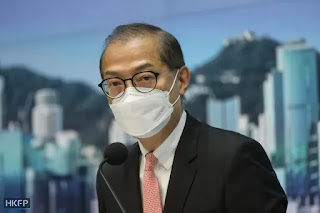 |
| Lee (middle) claims Covid-19 changes are not abrupt |
The border between Hong Kong and China will finally be lifted on January 10, while from December 29, the city will follow the mainland with no mandatory polymerase chain reaction (PCR) test on arrival, a complete scrapping of the Leave Home Safe app, and quarantine for close contacts.
Mask-wearing in public is the only thing that remains.
Lee added about 2.5 million people had been infected with Covid-19 and the vaccination rate had reached 94 percent for two doses, so the pandemic risks were manageable.
After years of "following the science", everything is suddenly scrapped, even though the infection numbers in Hong Kong have surged. When asked about this abrupt U-turn, Chief Executive John Lee Ka-chiu thought the change in direction was anything but startling.
"We have always been preparing [ourselves] for normalisation," he said in a press conference. "I have to do it progressively, orderly and under control, so we can assess the risk and go on... It's not rapid. It's not sudden."
 |
| Lo says it's time to put onus on HK residents |
However, government pandemic adviser David Hui Shu-cheong, who is a member of a chief executive-appointed advisory panel, said the group had not been consulted on the decision -- and warned the local healthcare system could be overburdened after the border reopened.
In an abrupt turn of face, Secretary for Health Dr Lo Chung-mau said it was time for Hong Kong residents to take on responsibility with regards to the pandemic.
"It's time for change -- from the government controlling the situation to handing over the responsibility and power of quarantine and infection prevention to residents. It's up to them to decide whether they have symptoms to see a doctor or take sick leave."
What?!
 |
| Tien worries about unvaccinated mainlanders |
But lawmaker Michael Tien Puk-sun disagreed with the move to end the vaccine pass scheme.
"If people coming from mainland China are not required to be fully vaccinated and enter restaurants after the border reopens, once the caseload increases, public hospitals will be full," Tien warned.
He said mainland visitors should be fully vaccinated just like other overseas arrivals.
Meanwhile upon hearing China is allowing its residents to travel from January 8, some countries like the United States, Japan and Italy have immediately insisted that not only mainland Chinese, but also those traveling from Hong Kong and Macau are not allowed into their countries without a negative test within two days of departure.
Even if people from China, Hong Kong and Macau are travelling through a a third country they still have to submit a negative test.
 |
| Chinese need negative test to enter US, Italy |
Interestingly Canada has not joined the bandwagon -- yet -- or it is too scared to make Beijing grumble further.
Regardless this testing is prudent from an epidemiological perspective, but from a political one it looks like a tit-for-tat.
Will this stop people from visiting the above-mentioned countries?
In the case of Japan, it has upended the travel plans of numerous Hongkongers who have been dying to go to the Land of the Rising Sun, at first only allowing them to land in Narita and Haneda airports in Tokyo, Kansai International Airport in Osaka, and Chuba Airport in Nagoya.
But now Hongkongers can land in three more places -- Hokkaido, and two airports in Okinawa.
Crisis averted -- for now.
Nevertheless in the meantime, the Hong Kong government should really stop the gaslighting and start admitting they have to follow Beijing. We all know it, just admit it!




No comments:
Post a Comment